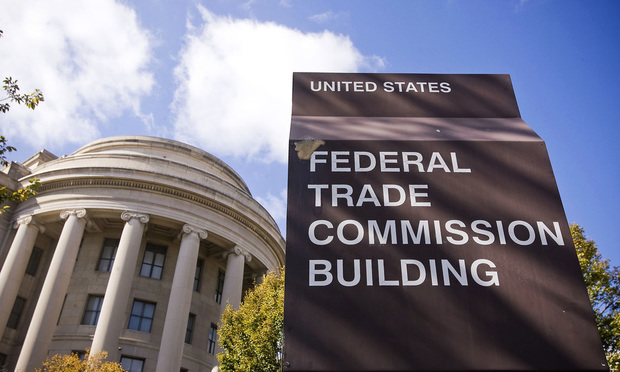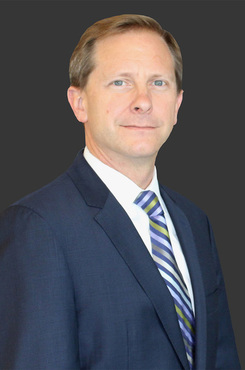FTC Competition Head Says Big Tech Investigations Are Attempt to Right Potential Wrongs
Bruce Hoffman, director of the Federal Trade Commission's Bureau of Competition, said that some reports of anti-competitive activity in Big Tech hearken back to the government's antitrust case against Microsoft in the late '90s.
September 24, 2019 at 06:53 PM
4 minute read
The original version of this story was published on The Recorder
 U.S. Federal Trade Commission building in Washington, D.C. Photo: Diego M. Radzinschi/ALM
U.S. Federal Trade Commission building in Washington, D.C. Photo: Diego M. Radzinschi/ALM
The head of the Federal Trade Commission's Bureau of Competition told lawmakers Tuesday that the agency's recent inquiries into Big Tech are part of an effort to reverse any possible errors in allowing mergers among the sector's largest firms to move forward.
"We get things wrong, absolutely," Bruce Hoffman, the director of the Bureau, testified before a subcommittee of the Senate Judiciary. "We're never going to get things 100% right. But when we determine that we're getting things wrong, we work really hard to try to fix that and get it right. And that's what we're trying to do now. I'm not saying it's necessarily the case that we had all this wrong. I don't know. That's what we're looking at."
Hoffman's remarks came in response to a question from Democratic Sen. Richard Blumenthal of Connecticut who asked if the FTC had been making predictions that have systematically led to less aggressive antitrust enforcement against the tech industry. Blumenthal, a former prosecutor, said that in prior testimony on the FTC's $5 billion settlement with Facebook in July, he saw an attitude of "If it looks tough, don't do it."
"I know as a former prosecutor, if you're not willing to try cases, you're not going to get good settlements," Blumenthal said.
 Bruce Hoffman. Courtesy photo
Bruce Hoffman. Courtesy photoHoffman pushed back, saying that, overall, he was proud of the FTC's enforcement history. And when the agency does mess up, Hoffman said, the FTC dedicates itself to fixing it. As an example, he pointed to the agency's pursuit of anti-competitive hospital mergers. The FTC, Department of Justice and states lost most of the hospital merger cases they tried in court for about a decade, he said.
"We eventually reversed that by doing things similar to what we're doing today," he said. At the time, the agency deployed a hospital merger retrospective project run by economists, launched a merger litigation task force and presented a new way to analyze data in court. Now, the FTC has an unbroken string of hospital merger litigation challenges, he said.
Blumenthal, who helped lead the government's antitrust case that began in the '90s against Microsoft, also asked if Hoffman saw parallels between that case and its current probes.
"Without talking about any specific investigation, you can certainly say that the kinds of allegations that you might read about in the Wall Street Journal or anywhere else sound very similar to the kind of conduct and the kind of basic fact pattern in the Microsoft case," Hoffman said.
The hearing came amid lawmakers expressing concerns over a lack of coordination between the FTC and antitrust enforcers at the Department of Justice. Republican Sen. Mike Lee of Utah kicked off Tuesday's hearing by referring to last week's testimony with the heads of the FTC and the DOJ's Antitrust Division saying that "it makes no sense, no sense at all, to split antitrust enforcement between two federal agencies."
Democratic Sen. Amy Klobuchar of Minnesota, who proposed antitrust legislation in August, asked Diana Moss, president of the American Antitrust Institute in Washington, D.C., if she would adjust the evidentiary standard for potentially anti-competitive acquisitions. Moss said the evidentiary standard of civil preponderance of evidence should be lowered, and there should be a burden shift.
"It's really difficult for the government to prove that a small startup firm but for the acquisition would have grown into a viable rival," she said. "That's a very high wall to scale when you're dealing with an enormous platform with all these ecosystem and network effects, and you're dealing with small startups that can barely get their foot in the door."
Hoffman said he wouldn't rule out the policy shift, but argued that it raises serious questions. "For example, would this be a standard that would apply to all acquisitions of any startup by anybody or would it only be by tech companies?" he asked. "We don't know what the tech companies are in the sense [there] is not a single industry into which they fall. So, even writing a definition that would cover them to establish the presumption would be challenging. And then if you establish a presumption that all such acquisitions are potentially anti-competitive, it's unclear to me what effects that would have on, for example, the venture capital markets."
This content has been archived. It is available through our partners, LexisNexis® and Bloomberg Law.
To view this content, please continue to their sites.
Not a Lexis Subscriber?
Subscribe Now
Not a Bloomberg Law Subscriber?
Subscribe Now
NOT FOR REPRINT
© 2025 ALM Global, LLC, All Rights Reserved. Request academic re-use from www.copyright.com. All other uses, submit a request to [email protected]. For more information visit Asset & Logo Licensing.
You Might Like
View All
Litigators of the Week: Shortly After Name Partner Kathleen Sullivan’s Retirement, Quinn Emanuel Scores Appellate Win for Vimeo

Litigators of the Week: A Knockout Blow to Latest FCC Net Neutrality Rules After ‘Loper Bright’

How Kramer Levin's Patent Trial Team Approaches Teaching Tech to Juries

Litigators of the Week: Kirkland Fends Off Antitrust Claims for Thomson Reuters Against AI-Backed Start-Up
Trending Stories
- 1Chief Judge Joins Panel Exploring Causes for Public's Eroding Faith in NY Legal System
- 2Pogo Stick Maker Wants Financing Company to Pay $20M After Bailing Out Client
- 3Goldman Sachs Secures Dismissal of Celebrity Manager's Lawsuit Over Failed Deal
- 4Trump Moves to Withdraw Applications to Halt Now-Completed Sentencing
- 5Trump's RTO Mandate May Have Some Gov't Lawyers Polishing Their Resumes
Who Got The Work
J. Brugh Lower of Gibbons has entered an appearance for industrial equipment supplier Devco Corporation in a pending trademark infringement lawsuit. The suit, accusing the defendant of selling knock-off Graco products, was filed Dec. 18 in New Jersey District Court by Rivkin Radler on behalf of Graco Inc. and Graco Minnesota. The case, assigned to U.S. District Judge Zahid N. Quraishi, is 3:24-cv-11294, Graco Inc. et al v. Devco Corporation.
Who Got The Work
Rebecca Maller-Stein and Kent A. Yalowitz of Arnold & Porter Kaye Scholer have entered their appearances for Hanaco Venture Capital and its executives, Lior Prosor and David Frankel, in a pending securities lawsuit. The action, filed on Dec. 24 in New York Southern District Court by Zell, Aron & Co. on behalf of Goldeneye Advisors, accuses the defendants of negligently and fraudulently managing the plaintiff's $1 million investment. The case, assigned to U.S. District Judge Vernon S. Broderick, is 1:24-cv-09918, Goldeneye Advisors, LLC v. Hanaco Venture Capital, Ltd. et al.
Who Got The Work
Attorneys from A&O Shearman has stepped in as defense counsel for Toronto-Dominion Bank and other defendants in a pending securities class action. The suit, filed Dec. 11 in New York Southern District Court by Bleichmar Fonti & Auld, accuses the defendants of concealing the bank's 'pervasive' deficiencies in regards to its compliance with the Bank Secrecy Act and the quality of its anti-money laundering controls. The case, assigned to U.S. District Judge Arun Subramanian, is 1:24-cv-09445, Gonzalez v. The Toronto-Dominion Bank et al.
Who Got The Work
Crown Castle International, a Pennsylvania company providing shared communications infrastructure, has turned to Luke D. Wolf of Gordon Rees Scully Mansukhani to fend off a pending breach-of-contract lawsuit. The court action, filed Nov. 25 in Michigan Eastern District Court by Hooper Hathaway PC on behalf of The Town Residences LLC, accuses Crown Castle of failing to transfer approximately $30,000 in utility payments from T-Mobile in breach of a roof-top lease and assignment agreement. The case, assigned to U.S. District Judge Susan K. Declercq, is 2:24-cv-13131, The Town Residences LLC v. T-Mobile US, Inc. et al.
Who Got The Work
Wilfred P. Coronato and Daniel M. Schwartz of McCarter & English have stepped in as defense counsel to Electrolux Home Products Inc. in a pending product liability lawsuit. The court action, filed Nov. 26 in New York Eastern District Court by Poulos Lopiccolo PC and Nagel Rice LLP on behalf of David Stern, alleges that the defendant's refrigerators’ drawers and shelving repeatedly break and fall apart within months after purchase. The case, assigned to U.S. District Judge Joan M. Azrack, is 2:24-cv-08204, Stern v. Electrolux Home Products, Inc.
Featured Firms
Law Offices of Gary Martin Hays & Associates, P.C.
(470) 294-1674
Law Offices of Mark E. Salomone
(857) 444-6468
Smith & Hassler
(713) 739-1250






